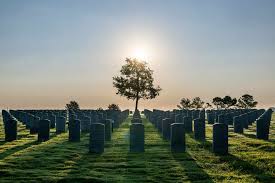Eleventh Sunday in Ordinary Time
“… the kingdom of God … is like a mustard seed, which, when sown upon the ground, is the smallest of all the seeds on earth; yet when it is sown it grows up and becomes the greatest of all shrubs ….” Mk 4: 30-32
The Archbishop of Chicago, Blase Cupich, once gave a remarkable talk at a Catholic Health Association Annual Meeting.
In it, he highlighted the often-neglected transformative work done by the “religious women who have been singularly responsible for inaugurating, building and maintaining the Catholic health care system passed on to us today.” He informed everyone, for example, that Mercy Hospital, established in 1852, was the first chartered hospital in the city of Chicago.
A “mustard seed” that became a “shrub.”
He then told a story.
“In the early 1920’s, the knights of the bed sheets (the Klan) cooked up a scheme in Kokomo, Indiana to drive out the Sisters of St. Joseph who ran the local hospital. On July 4, 1923, an estimated 200,000 Klan members gathered in Kokomo. A huge flag was used that day to collect a reported $50,000 for construction of the Howard County Hospital, a ‘Klan hospital’ to compete with the sister’s health care efforts and put them out of business.”
“Then, one night (some years later) a sick, disheveled man stumbled into their emergency room. He had no money on him, so Howard County Hospital threw him out. In those days, nuns didn’t ask patients about money, so they welcomed him at St. Joseph’s and healed him. It turned out that this man was J. Henry Fisse, Jr., a local real estate magnate and one of the Klan’s major benefactors. Their rejection of him backfired ironically to the benefit of the sisters. The wealthy man rewrote his will and substituted the sisters as the beneficiaries. To make matters worse for the Klan, when the sisters’ hospital some years later needed room to expand, they used Fisse’s money to buy Howard County Hospital, the very one founded by the Klan to put them out of business.”
What the Archbishop was doing was telling the story of a mustard seed – a small group of nuns who aimed their efforts at the poor and the marginalized and grew and grew because of it.
Then he told another story.
“On November 1, 1930, a stocky, black-bearded young man entered St. Vincent Hospital in Billings, Montana. He was in agony, holding his left arm, shattered in a car crash. Soon, he found himself being charmed by his nurse, a shy young nun, Sister Florence Cloonan. She was continually fretting over whether she had done enough for her patients, most of them a rough lot of cowboys and gamblers.
Her bearded patient was Ernest Hemingway. He later immortalized her as Sister Cecilia in the short story ‘The Gambler, the Nun, and the Radio.’
The Archbishop goes on to say that “Hemingway recognized in the care he received in Montana that the sisters had the ability to awaken something new in the lives of even the roughest of men to the point that they could respond with the same kind of tenderness they received and found attractive in the sisters….Their work created a connection and credibility with people on a deep level, attracting and disposing them to the call of God.”
These sisters were the “mustard seeds” of today’s gospel.
Here in Peoria, we could tell a similar story.
In 1876, a small group of Franciscan sisters were sent to Peoria, Illinois by a German expatriate group. That tiny original hospital has grown to become the largest in central Illinois. It’s growth from a tiny “mustard seed” has included it now being regarded as a clinical training hospital for many medical students, interns, residents, and fellows of the Peoria campus of the University of Illinois.
Another “mustard seed” that became a “shrub.”
Jesus is talking to us today about little people doing little things. And reminding us how much those “little things” truly matter – how they are “seeds” that will grow into “shrubs.”
That’s the story of most of our lives. We’re little people doing little, ordinary things. We’re not heroic. We’re not headlining the news. We’re not famous.
We’re just people trying our best to be kind to the waitress who’s overburdened with demands. We’re just people donating a little money we need for other purposes to those who are hungry and homeless. We’re just people who are offering our time and a few talents to visit the sick and care for the needy. We’re just people trying our best to get our kids educated and our mortgages paid off and our jobs taken care of.
Nothing spectacular. Nothing that will go noticed.
But what Jesus is telling us today is that all that time you spend parenting, all that effort you give to teaching and coaching and passing on one kindness and one encouragement after another, all those moments you spend praying for someone other than yourself, and all those words of wisdom you tried to pass on to another generation – all that, and so much more, is the “mustard seed” that builds up into the “shrub” that becomes the kingdom of God.
That’s what the earliest Christian community did.
They were an extremely small group of people. But they were dedicated to living out their lives in a spirit of humility and hospitality and love. They were just “mustard seeds” that became a “shrub.” Like the nuns mentioned above, they awakened something new and vital in others, something, as the Archbishop says, “that attracts and disposes others to the call of God.”
The same is true for each of us. All those efforts we each make to reach out in kindness and compassion and justice really do matter. They matter a lot. Because in the end they will make all the difference in the world – the difference between our children and grandchildren inheriting a place of peace and justice and charity.
Ted Wolgamot, Psy.D.
11809194.1
6/11/18




